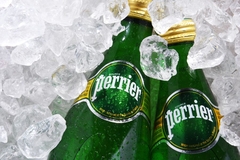
- Industry news
Industry news
- Category news
Category news
- Reports
- Key trends
- Multimedia
- Journal
- Events
- Suppliers
- Home
- Industry news
Industry news
- Category news
Category news
- Reports
- Key trends
- Multimedia
- Events
- Suppliers
French court rejects case against Nestlé’s Perrier over “natural mineral water” claims
Key takeaways
- French court allows Perrier to continue marketing as “natural mineral water” despite UFC-Que Choisir complaint.
- Consumer group ordered to pay €5,000 (US$5,787) to Nestlé after court finds no established health risk.
- Controversy stems from Nestlé’s use of banned water treatments and subsequent switch to microfiltration.

A French court yesterday rejected a complaint from the consumer advocacy group UFC-Que Choisir, which sought to block Perrier from marketing its sparkling water as “natural mineral water,” ruling the company can continue using the designation despite its use of microfiltration processes.
The Nanterre court found no established health risk from Perrier waters labeled as natural mineral water and ordered UFC-Que Choisir to pay €5,000 (US$5,787) to Nestlé. The decision marks the latest development in an ongoing controversy over water treatment methods used by major bottled water brands in France.
UFC-Que Choisir filed its complaint in June, arguing that Perrier’s microfiltration techniques disqualify the product from being labeled natural mineral water under French and European regulations. The consumer group contended the filtration processes constituted unauthorized treatments that alter the water’s original state.
“The existence of a health risk to consumers linked to Perrier waters labelled ‘natural mineral waters’ has not been established,” the court says in its ruling.
Nestlé Waters welcomed the decision in a statement. “Today’s decision confirms that the food safety of Perrier natural mineral waters has always been guaranteed and that under the current circumstances, Perrier natural mineral water can continue to be sold,” the company says.
Banned filtration methods
Marie-Amandine Stevenin, head of UFC-Que Choisir, expressed frustration with the outcome, according to AFP. “We are angry. We believe that this decision does not live up to the issues we were denouncing, namely misleading commercial practices,” she says.
The case stems from revelations in early 2024 that Nestlé Waters had been using prohibited water treatment processes, including ultraviolet treatment and activated carbon filtration, on its natural mineral water brands.
French and European law prohibit such treatments for products marketed as natural mineral water because they alter the water’s original characteristics. A French Senate inquiry concluded in May, finding that government authorities had covered up the use of these banned treatments for years.
Following the revelations, Nestlé Waters paid a €2 million (US$2.2 million) fine to settle criminal probes without admitting guilt. The Swiss food giant switched from the banned methods to microfiltration, which it maintains is safe and does not alter the water’s mineral composition. But UFC-Que Choisir argues that even microfiltration represents an unapproved treatment process.
Regulatory uncertainty
The controversy deepened in July when local authorities requested Nestlé Waters remove its 0.2 micron microfiltration system at the Vergeze factory, where Perrier is produced. The company replaced it with a 0.45 micron device, which it already uses for its Vittel brand and has discussed with regulators.
Perrier originates from a spring in southern France. Bacterial contamination from fecal matter has been detected on multiple occasions in the wells supplying Perrier, particularly after heavy rainfall, according to AFP. Nestlé Waters says such incidents have been rare and that it no longer uses affected wells.
On its website, Nestlé Waters acknowledges the regulatory uncertainty. “Perrier water carries the designation ‘natural mineral water,’ even though it may not fully qualify as such,” the company states. “Consequently, Nestlé Waters has requested the necessary administrative authorizations to ensure compliance with the regulatory framework.”
UFC-Que Choisir has filed two additional legal procedures in France against Nestlé and other parties allegedly involved in using banned filtering methods for natural mineral waters. The water filtering controversy adds to pressures facing Nestlé, which has struggled with management turnover, volatile consumer demand, and sales growth that slumped last year to its lowest level in decades, according to Bloomberg.











